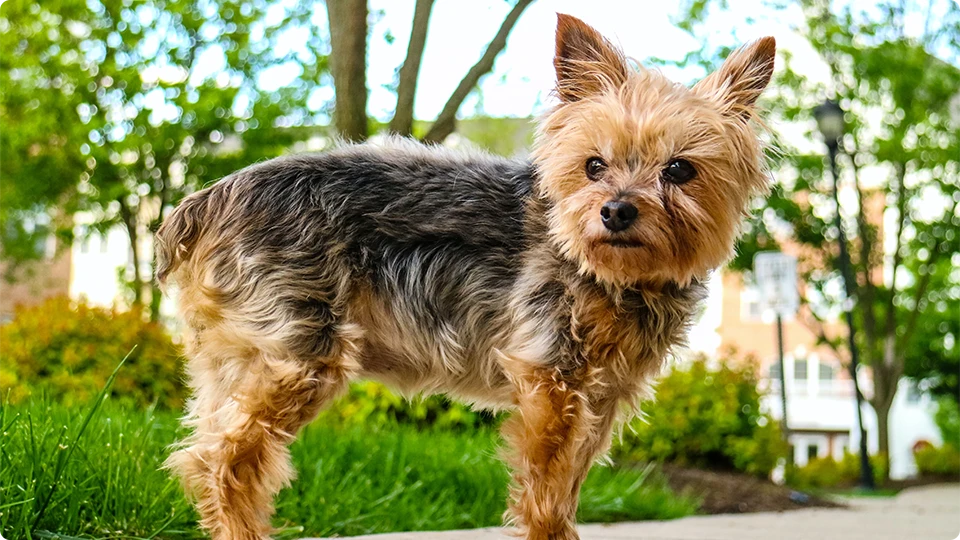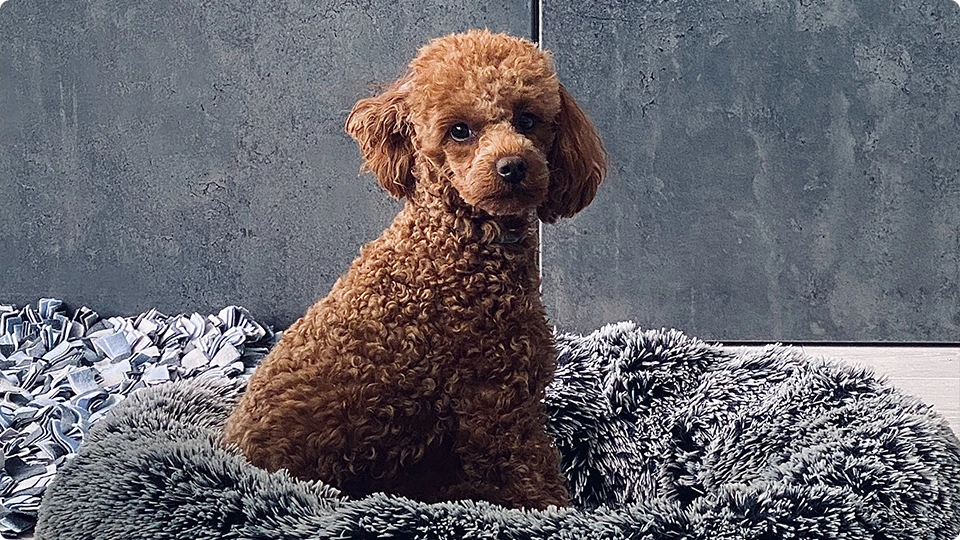How big does a full grown Yorkie Poo get? If you’re thinking about getting a Yorkshire Terrier/Poodle mix, also known as a Yorkie Poo, then you’re probably wondering just how big this breed can get. And if weight is a concern, what kind of diet and exercise routine should you put your pup on? Lucky for you, we’ve got all the answers right here! Keep reading to learn more about Yorkie Poo weight and size.
An Overview of the Yorkie Poo
The Yorkie Poo is a relatively new breed of dog, only coming into existence within the last 20 years or so. This hybrid was created by crossing a Yorkshire Terrier with a Toy or Miniature Poodle. The result is a small, intelligent, and easily trainable pup that does well in both city and suburban environments.
The Yorkshire Terrier was originally bred in England as a working dog. They were used to catch rats in textile mills and other businesses. When they were first brought to the United States, they were used as lap dogs and to help keep away rats and other vermin from the home.
The Poodle was originally used as a hunting dog in Germany. They were bred to retrieve waterfowl from the water. The Poodle is an intelligent breed and is easily trainable. They are also one of the most popular breeds in the United States.
Temperament
The Yorkie Poo is a cross between two of the most popular dog breeds in the United States, the Yorkshire Terrier and the Poodle. Because of this, you can expect their temperament to be a mix of both.
The Yorkshire Terrier is a feisty little dog that is full of energy. They are independent and sometimes stubborn, but they are also friendly and make great lap dogs. The Poodle is an intelligent breed that is easily trainable.
When you combine these two breeds, you get a pup that is full of energy and intelligence. They will require plenty of exercise and stimulation to keep them from becoming bored or restless. They will also require regular training to help keep them from becoming too stubborn or independent. Yorkie Poos make wonderful pets for families with children as well as seniors.
Appearance
Yorkie Poos come in a variety of colors, including black, tan, white, and gray. Some may also have a mix of colors, such as black and white or gray and white. Yorkie Poos can have a variety of coat types, depending on the genes they inherit from their parents. Some may have a straight, glossy coat like a Yorkie, while others may have a curly, wavy coat more like a Poodle. Many owners will choose to keep their Yorkie Poo’s coat short and easy to groom, but others may choose to let it grow out in a luxurious mane.
Parent Breed Sizes
Yorkshire Terrier Size

Yorkshire Terriers are a small breed of dog that can range in size from about 4 to 7 pounds. While there is no one definitive answer as to why this is, there are several factors that can influence a Yorkie’s size. Some of these include the parent breeds’ sizes, diet, and environment.
One reason Yorkshire Terriers can be such a wide range of sizes is because they come from multiple parent breeds – Maltese, Skye Terrier, and the Manchester Terrier. This means that depending on which parent breed the Yorkie takes after more, its size could be influenced.
Another factor that can play into how big a Yorkie grows is its diet. If it has a high-quality diet with plenty of nutrients and protein, it will likely grow to be a larger dog. However, if it doesn’t have good nutrition or if it’s malnourished, it will likely be smaller than average.
The environment in which a Yorkie lives can also affect its size. If it lives in a warm climate where it can get plenty of exercise, it will likely be larger. If it lives in a colder climate or doesn’t have access to a lot of space to run and play, it will likely be smaller.
Poodle Sizes

Poodles come in three sizes – toy, miniature, and standard. While all three sizes are considered small dogs, they can range quite a bit in terms of height and weight.
Toy Poodles are the smallest of the bunch, weighing in at about 4 to 6 pounds and standing no more than 10 inches tall.
Miniature Poodles are a bit larger, weighing in at about 15 to 17 pounds and standing no more than 15 inches tall.
Standard Poodles are the largest of the three, weighing in at about 40 to 60 pounds and standing no more than 24 inches tall.
| Breed Sizes | Weight (Pounds) | Height (Inches) |
| Toy Poodle | 4 to 6 pounds | 10 inches tall |
| Mini Poodle | 15 to 17 pounds | 15 inches tall |
| Standard Poodle | 40 to 60 pounds | 24 inches tall |
Related: When is a Toy Poodle Full Grown?
Factors that Influence Yorkie Poo Size
So, what does this all mean for the Yorkie Poo? Well, since it’s a cross between the Yorkshire Terrier and the Poodle, it can be any size that falls somewhere in between those two breeds. There are a large range of factors that can influence the size of a Yorkie-Poo, including:
Poodle parent size
The best way to predict how big your Yorkie Poo will be as an adult is to take a look at its parents. If both of its parents are on the smaller side, it’s likely that your dog will be too. However, if one or both of its parents are on the larger side, it’s more likely that your dog will be as well.
Gender
Another factor that can influence a Yorkie Poo’s size is its gender. Generally speaking, male dogs are going to be larger than females. So, if you have a male Yorkie Poo, he may be on the bigger side compared to a female of the same age and breed.
Generation
The generation of your Yorkie Poo can also play a role in its size. First generation Yorkie Poos (F1) are 50% Yorkshire Terrier and 50% Poodle. These dogs tend to be somewhere in the middle when it comes to size, often taking after the Poodle parent more than the Yorkie.
Previous litters
Looking at your dog’s previous litters can give you a good idea of how big he or she is likely to be. If the majority of the litter was on the smaller side, it’s likely that your dog will be as well. However, if most of the litter was larger than average, there’s a good chance your dog will be too.
Diet
Another factor that can play a role in your Yorkie Poo’s size is its diet. If it’s well-nourished and eats a high-quality diet with plenty of protein, it will likely be a larger dog. However, if it doesn’t have good nutrition or if it’s malnourished, it will likely be smaller.
Full Grown Yorkie Poo Height & Weight: What to Expect
Now that you know all of the factors that can influence a Yorkie Poo’s size, you’re probably wondering how big your dog is going to be as an adult. There are two main size categories for Yorkie Poos: the Mini Yorkie Poo and the Toy Yorkie Poo. The average height and weight for each type is broken down below.
Mini Yorkie Poo weight and height
This full grown adult dog will likely weigh between 10 and 14 pounds, with a height of 10 to 15 inches. This breed is significantly larger than their Yorkshire Terrier ancestry.
Compared to many other breeds of dogs, Mini Yorkie Poos grow relatively slowly. They typically won’t reach their full adult size until they are around 18 months old. During their first year of life, they will typically grow at a rate of about 2 to 4 pounds per month and will reach approximately 75% of their adult size.
Toy Yorkie Poo weight and height
A full grown Toy Yorkie Poo will weigh between 4 and 7 pounds, and will be between 8 and 11 inches tall. They are slightly smaller than the Mini Yorkie Poo, but are still significantly larger than their Yorkshire Terrier ancestry.
Toy Yorkie Poos grow a bit more quickly than the Standard or Miniature Yorkie Poo. They will most likely reach their final adult size by 12 to 14 months old. In terms of weight, they gain 1 to 2 pounds each month during year one and will grow to approximately 75% the size of its full-grown adult form.
What Next?
Now that you know all about the full grown Yorkie Poo, you may be wondering how to prepare for bringing one home. Here are a few tips to get you started.
- Puppy Proofing: Just like with any other pet, it’s important to puppy proof your home before bringing your Yorkie Poo home. This means putting away any dangerous items or chemicals and making sure all of your electrical cords are out of reach.
- Training: It’s also important to start training your new pup as early as possible. Puppies are much easier to train when they’re young than when they’re older, so get started as soon as possible!
- Food and Supplies: You’ll also need food and supplies for your new pup, such as a crate, toys, food and water bowls, and a collar and leash.
Make sure you have everything ready before your pup comes home!